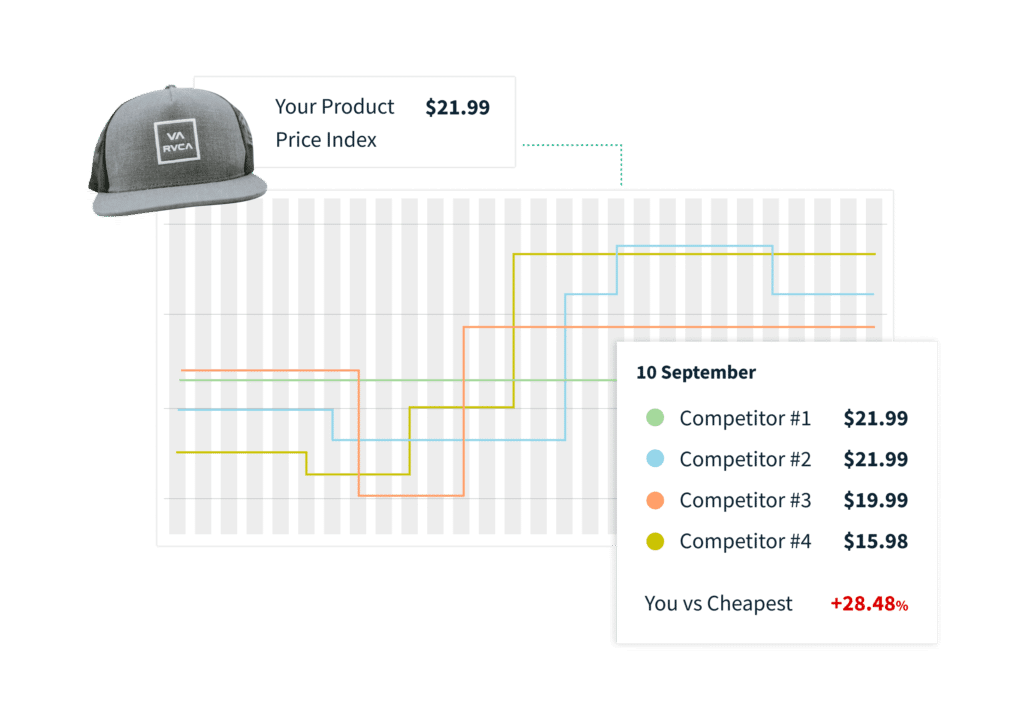Use Cases for AI in E-Commerce
22/01/24
5'
For over a year, AI has been revolutionizing various aspects of business, notably in e-commerce. This article delves into specific AI use cases in this sector, highlighting examples such as Amazon’s AI-driven shopping assistant, eBay’s AI for generating product descriptions, or the use of dynamic pricing models. Each case study exemplifies how AI is not only changing the way businesses interact with customers but also how it’s streamlining operations and decision-making processes in the e-commerce landscape. Read further.
1/ AI Shopping with Amazon
Since utilizing generative AI for summarizing customer reviews, Amazon has advanced its AI integration with the launch of an AI-powered shopping assistant in early 2024. This tool allows customers to interact and inquire about products using advanced AI technology, marking a significant step in Amazon’s foray into the highly competitive AI domain.
On product pages, the “Looking for specific info?” section, which previously utilized customer reviews and questions for searching and allowed users to submit new queries for seller or customer responses, now operates with AI assistance on the iPhone/Android app. This AI feature utilizes product details and reviews to provide AI-generated answers to a wide range of possible questions.

Image credit: Marketplace Pulse.
For instance, when considering a pair of wireless headphones, customers might ask questions like “Do these headphones have noise-cancellation features?” or “How long does the battery last on a single charge?” or even “Are they comfortable for long periods of use?” The AI responds with a specific text answer to each question, aiming to condense the information from individual reviews into a summary that addresses the features most relevant to the shopper.
Amazon’s AI assistant, currently limited to handling one product at a time without comparing or suggesting alternatives, lacks features like adding items to carts or providing historical pricing. In its experimental phase, it’s a bit overshadowed by Amazon’s myriad features. Future updates promise significant improvements, including the ability to make purchases or add items to wish lists, and an expanded scope covering Amazon’s entire catalog, potentially marking a major shift in its capabilities.
2/ Ebay’s AI for product descriptions
Ebay also has developed an AI-powered tool, known as the “magical listing” tool, intended to assist sellers in creating detailed product descriptions more efficiently. This tool is particularly useful for new sellers, helping them overcome initial challenges associated with crafting competitive listings online. The primary purpose of these AI assistants is to simplify the listing process, especially for those who are uncertain about how to start.
In its business strategy, eBay is increasingly incorporating AI technologies. The specific timeline for the development of the magical listing tool has not been disclosed, but its earlier version allowed sellers to generate listing titles, categorize their items, and use AI to create product descriptions.

Image credit: eBay.
Additionally, eBay has launched an image-based version of this tool. By leveraging AI, it can produce detailed product descriptions from a single photograph. The user experience is straightforward: taking a photo triggers the AI to generate key information such as titles, descriptions, release dates, and sub-categories, and it can also suggest pricing and shipping costs.
For the time being, this new tool is only available to iOS users through the eBay app, but there are plans to expand its availability. The previous version of this tool, which used user-input titles to create product descriptions, was well-received, as indicated by eBay’s data: 30% of U.S. sellers on the app engaged with it daily, and a majority preferred the AI-generated descriptions.
3/ Netrivals’ Dynamic Pricing

Image credit: Lengow.
Dynamic pricing, enhanced by AI, enables real-time adjustments to prices and offerings, considering user behavior, global market trends, and competitive landscapes. AI empowers multichannel retailers with flexible price structuring across various sales channels, allowing for intelligent discounting in response to demand spikes on platforms like Amazon. Additionally, AI supports assortment intelligence, optimizing product variety and selection based on data-driven insights into market trends and competitors. This approach ensures that retailers can adapt their selection and maintain competitive pricing.
Integrating Netrivals into this framework elevates dynamic pricing by providing advanced market and competitor analysis, ensuring sellers can optimally adjust prices and offerings to stay ahead in their markets. As Yannick den Boer from Productpine, the sustainable D2C marketplace, puts it about his experience with Netrivals: “Netrivals has automated tedious manual work for us so we can focus on our core competencies. We saw results from the beginning and can no longer imagine working without it.”
4/ AI features with Shopify Magic
Shopify Magic is a collection of free AI-enabled features integrated into Shopify’s products and workflows, designed to help users start, run, and grow their online businesses more efficiently. It utilizes advanced AI technology for personalized support in store building, marketing, customer support, and back-office management. Key features include automatic text generation using Large Language Models (LLMs) for creating product descriptions, email subject lines, and more. Shopify Magic also includes Sidekick, an AI commerce assistant for personalized task assistance, and app review summaries for quicker app selection in the Shopify App Store.
Dropshipping businesses can benefit from this Shopify AI experience. Based on feedback from numerous CEOs, Co-Founders, and Directors, Shopify Magic has significantly streamlined business operations. It automates tasks like generating product descriptions and managing inventory, making processes more efficient.
Your e-commerce library
Clarins x NetMonitor Success Story
Learn moreSuccess on Marketplaces
Learn moreCompetitive Intelligence
Learn moreSign up for our newsletter
By submitting this form you authorize Lengow to process your data for the purpose of sending you Lengow newsletters . You have the right to access, rectify and delete this data, to oppose its processing, to limit its use, to render it portable and to define the guidelines relating to its fate in the event of death. You can exercise these rights at any time by writing to dpo@lengow.com

Trending Posts
Marketplaces
The Top 10 Marketplaces in Europe (2026)
The e-commerce scene is a vibrant mix of marketplaces in Europe. These aren't just websites; they're bustling hubs where millions…
02/01/26
8'
Marketing channels
ChatGPT Ads and advertising on GenAI Search Engines: what you need to know
Advertising on generative AI-based search engines (GenAI) marks a new era in digital marketing. After two decades dominated by traditional…
18/01/26
8'
Marketplaces
The French Marketplace Landscape: What Brands Need to Know
France has quietly become Europe's marketplace laboratory. Lengow's exclusive ranking reveals why traditional retailers, not tech giants, dominate the game.…
08/01/26
6'
E-commerce Trends
Google’s Universal Commerce Protocol: The End of E-Commerce as We Know It?
On January 11, 2026, at the NRF Retail's Big Show in New York, Google unveiled the Universal Commerce Protocol (UCP),…
16/01/26
6'
Marketing channels
What the World Is Unboxing on TikTok and Instagram (Haul & Unboxing Index 2025)
Opening a package on camera has become much more than simple entertainment. In 2026, "haul" and "unboxing" videos serve as…
20/01/26
7'




